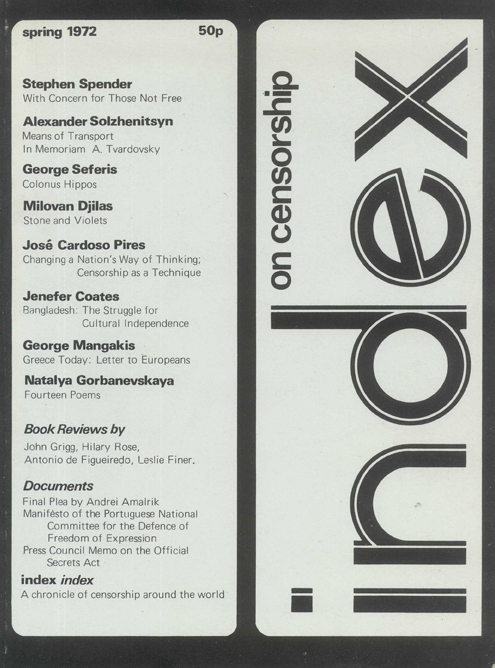[vc_row full_width=”stretch_row_content” full_height=”yes” columns_placement=”stretch” equal_height=”yes” css=”.vc_custom_1594032073955{background-image: url(https://www.indexoncensorship.org/wp-content/uploads/2016/10/magazine-art-1460×490.png?id=80524) !important;}”][vc_column][/vc_column][/vc_row][vc_row][vc_column][vc_custom_heading text=”Shakespearean actress Janet Suzman said about our special Shakespeare 400 issue: “From every corner of the unfree world the essays you have printed bear me out; theatre is a danger to ignorance and autocracy and Shakespeare still holds the sway. I congratulate you and Index on giving such space to a writer who is still bannable after 400 plus years.”” google_fonts=”font_family:Libre%20Baskerville%3Aregular%2Citalic%2C700|font_style:400%20italic%3A400%3Aitalic”][/vc_column][/vc_row][vc_row][vc_column][vc_column_text]
A quarterly magazine set up in 1972, Index has published oppressed writers and refused to be silenced across 252 issues.
The brainchild of the poet Stephen Spender, and translator Michael Scammell, the magazine’s very first issue included a never-before-published poem, written while serving a sentence in a labour camp, by the Nobel Prize-winning Soviet dissident Aleksandr Solzhenitsyn.
The magazine continued to be a thorn in the side of Soviet censors, but its scope was far wider. From the beginning, Index declared its mission to stand up for free expression as a fundamental human right for people everywhere – it was particularly vocal in its coverage of the oppressive military regimes of southern Europe and Latin America, but was also clear that freedom of expression was not only a problem in faraway dictatorships. The winter 1979 issue, for example, reported on a controversy in the United States in which the Public Broadcasting Service had heavily edited a documentary about racism in Britain, and then gone to court attempting to prevent screenings of the original version.
[/vc_column_text][/vc_column][/vc_row][vc_row][vc_column width=”1/4″][vc_icon icon_fontawesome=”fa fa-quote-left” color=”custom” align=”right” custom_color=”#dd3333″][/vc_column][vc_column width=”3/4″][vc_custom_heading text=”An archive of past battles won, and a beacon of present and future struggles. It’s unique brand of practical, practising advocacy is as necessary as ever.” font_container=”tag:h2|text_align:left|color:%23dd3333″ google_fonts=”font_family:Libre%20Baskerville%3Aregular%2Citalic%2C700|font_style:400%20italic%3A400%3Aitalic”][/vc_column][/vc_row][vc_row][vc_column][vc_column_text]
Index stood firmly against the apartheid regime. South African Nadine Gordimer, yet another Nobel prize-winning author, wrote regularly for the magazine. Big names from around the literary world flocked to contribute to the magazine, often before their struggles had brought internal accolade – a single issue in 1983 included the exiled Nigerian writer Wole Soyinka, later a Nobel prize winner, and Czechoslovakian dissident Vaclav Havel, who went on to be his country’s last president before it split into Slovakia and the Czech Republic. Kurt Vonnegut and Arthur Miller were also among the more famous bylines. Salman Rushdie, the author at the centre of the Satanic Verses controversy, was frequently featured on Index’s pages while there was a bounty offered for his murder by the Iranian government.
After the fall of communism, there was a widespread misconception that censorship was “over”, but journalists, authors and dissidents have continually reached out to Index when squeezed. The Russian reporter Anna Politkovskaya wrote in 2002 of the threats made against her life when she began investigating Russia’s war in Chechnya, four years before she was assassinated in Moscow.
After more than 40 years, Index continues to stand with the silenced all over the world. In October 2016, the Times Literary Supplement described it as “an archive of past battles won, and a beacon of present and future struggles. It’s unique brand of practical, practising advocacy is as necessary as ever.”
Talk to us today.
[/vc_column_text][vc_column_text]Words: Kieran Etoria-King[/vc_column_text][/vc_column][/vc_row][vc_row content_placement=”top”][vc_column width=”1/3″][vc_custom_heading text=”Support Index” font_container=”tag:p|font_size:24|text_align:left” link=”url:https%3A%2F%2Fwww.indexoncensorship.org%2F2016%2F12%2Ffashion-rules%2F|||”][vc_column_text]
In times of extraordinary crisis, governments often take the opportunity to roll back on personal freedoms and media freedom.
Will you join with others from around the world who have concerns about restrictions on freedoms to support our work?
![]() DONATE NOW[/vc_column_text][/vc_column][vc_column width=”1/3″][vc_single_image image=”113840″ img_size=”medium” alignment=”center” onclick=”custom_link” link=”https://www.indexoncensorship.org/2016/12/fashion-rules/”][/vc_column][vc_column width=”1/3″ css=”.vc_custom_1481888488328{padding-bottom: 50px !important;}”][vc_custom_heading text=”Subscribe” font_container=”tag:p|font_size:24|text_align:left” link=”url:https%3A%2F%2Fwww.indexoncensorship.org%2Fsubscribe%2F|||”][vc_column_text]The world’s most important writers. In print, online. In your mailbox, on your iPad.
DONATE NOW[/vc_column_text][/vc_column][vc_column width=”1/3″][vc_single_image image=”113840″ img_size=”medium” alignment=”center” onclick=”custom_link” link=”https://www.indexoncensorship.org/2016/12/fashion-rules/”][/vc_column][vc_column width=”1/3″ css=”.vc_custom_1481888488328{padding-bottom: 50px !important;}”][vc_custom_heading text=”Subscribe” font_container=”tag:p|font_size:24|text_align:left” link=”url:https%3A%2F%2Fwww.indexoncensorship.org%2Fsubscribe%2F|||”][vc_column_text]The world’s most important writers. In print, online. In your mailbox, on your iPad.
Subscription options from £18.
Every subscriber helps support Index on Censorship’s projects around the world.
![]() SUBSCRIBE NOW[/vc_column_text][/vc_column][/vc_row]
SUBSCRIBE NOW[/vc_column_text][/vc_column][/vc_row]













